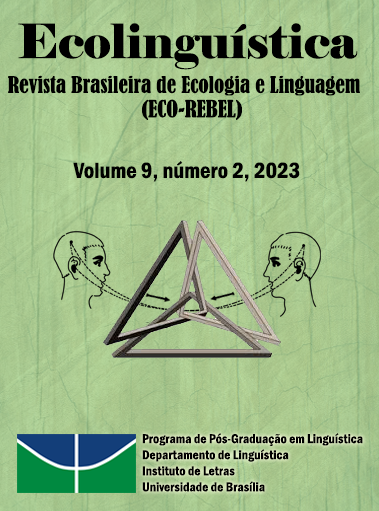Geomorfologia e a hidronímia ecolinguística em Moçambique: a língua e o meio ambiente em debate
Keywords:
Ecolinguística; Toponímia; Geomorfologia; Meio ambiente.Abstract
O português é a língua oficial de Moçambique, segundo as Constituição de 2004, embora não seja a língua materna da maioria dos moçambicanos, especialmente nas zonas rurais e suburbanas. Os moçambicanos são bantófonos, falando mais de 20 línguas. Essas línguas foram importantes na atribuição de nomes de rios, montes e outros elementos da geomorfologia de Moçambique. A hidronímia se dedica ao estudo dos cursos da água, lagos, mares e assemelhados (Couto, 2007) e a geomorfologia se dedica ao estudo das formas da superfície terrestre. A presente pesquisa estuda os nomes desses elementos da geomorfologia e sua relação com a cultura e línguas locais. Trata-se de uma pesquisa bibliográfica e documental, da qual se conclui que os nomes de montes e rios de Moçambique estabelecem uma intrínseca relação com as línguas e do povo buscando uma identidade. Conclui-se que a ecologia linguística é fundamental para equilíbrio ambiental do povo de Moçambique.
Downloads
Published
Issue
Section
License

This work is licensed under a Creative Commons Attribution-NonCommercial-NoDerivatives 4.0 International License.
Authors who publish in this journal agree to the following terms:
Authors retain copyright and grant the journal the right of first publication. The work is simultaneously licensed under the Creative Commons Attribution License allowing the sharing of the work with acknowledgment of the authorship of the work and initial publication in this journal.
Authors are authorized to enter into additional contracts separately for non-exclusive distribution of the version of the work published in this journal (e.g., publishing in institutional repositories or as book chapters), with acknowledgment of authorship and initial publication in this journal.
Authors are allowed and encouraged to post and distribute their work online (e.g., in institutional repositories or on their personal page) at any point before or during the editorial process, as this can bring about productive revisions as well as increase impact.
Citation of published works (See The Effect of Free Access).



3.png)



